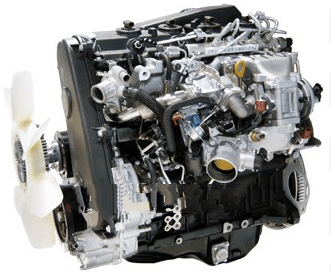Toyota 2KD-FTV Engine (2.5 D-4D) Specs, Problems, Reliability. Toyota’s 2KD-FTV engine, likewise called 2.5 D-4D, is a 2.5-liter inline four-cylinder turbo diesel engine. The engine has been produced since 2001 at a Japanese Toyota’s plant and is installed in the Toyota Fortuner and 4Runner SUVs, Hilux pickups, and Innova, Hiace minivans. Toyota’s 2.5 L diesel engine belongs to the KD series, which included a 3.0-liter version – 1KD-FTV, but the 2KD is more related to the previous 2L engine.
The engine has a trustworthy cast iron, deep-skirt cylinder block, a crankshaft with eight balance weights and five journals, high-strength linking rods, and aluminum pistons with Ni-resist cast iron ring providers. At the bottom of the engine block, there are piston cooling oil jets, sprayed oil into the internal cooling channels of the pistons. Like the 1KD, the 2KD-FTV has an aluminum alloy 16-valve cylinder head. There is a steel-laminate type head gasket in between cylinder head and cylinder block. On top of the engine, there are double overhead camshafts. The 2KD uses a rubber timing belt, which drives the intake camshaft just, while the exhaust camshaft is driven through a gear on the consumption camshaft. Each cylinder has two intake and 2 exhaust valves. The valvetrain uses strong valve lifters (no hydraulic lifters).
Like the 1KD, the 2KD-FTV is geared up with Toyota’s D-4D common-rail direct injection system. Instead of a variable geometry turbocharger, there is a turbocharger with mechanical wastegate valve (2KD-FTV in Thailand features VNT turbochargers – Variable-Nozzle Turbine). The more effective 2KD-FTV engines have an air-to-air type intercooler installed on top of the engine. The high-pressure fuel pump produces pressure varied from 30 to 135 MPa for a routine engine variation and up to 160 MPa – for the 2KD-FTV High Variation.
In 2005, the engine went through some changes. It features the 3rd generation of Typical Rail System (CRS) produced by Denso Corporation. The new injection system provides ultra-high injection pressure up to 200 MPa (29,000 psi). The compression ratio was minimized to 17.4:1. To experience Euro 3+ emissions standards, the engine was equipped with cooled EGR (exhaust gas recirculation).
The 2KD-FTV is leaving in the past. Toyota currently practically replaced the KD series in production by the new GD diesel family. This 2.5 L turbo diesel paved the way for a 2.4-liter 2GD-FTV engine.
Table of Contents
Toyota 2KD-FTV Engine (2.5 D-4D) Engine Problems and Reliability
The 2KD diesel engine can hardly be called extremely dependable. The list of problems extremely comparable to the 1KD has. Till 2011, there was an issue with piston splitting. The piston oil rings are prone to stick and after that cause high oil intake. It is required to adjust the valve clearances frequently. Otherwise, the engine will have floating/unstable idling and loss of power. Lots of owners also complain about its too noisy operation and strong vibrations. The 2KD-FTV prefers a good fuel, low-grade diesel fuel kills the injectors extremely fast (by less than 50k miles).
In general, the engine does not have any significant disadvantages compared to gas opponents in this power variety. An approximal engine life of Toyota’s 2.5 D-4D has to do with 250,000 miles (400,000 km).
you must see more engine detail in here: Engine – US Cars News or you can see on wiki here
Toyota 2KD-FTV Engine (2.5 D-4D) Specs
| Manufacturer | Toyota Motor Corporation |
| Production years | 2001-present |
| Cylinder block material | Cast iron |
| Cylinder head material | Aluminum |
| Fuel type | Diesel |
| Fuel system | Common rail direct injection |
| Configuration | Inline |
| Number of cylinders | 4 |
| Valves per cylinder | 4 |
| Valvetrain layout | DOHC |
| Bore, mm | 92.0 mm (3.62 in) |
| Stroke, mm | 93.8 mm (3.69 in) |
| Displacement, cc | 2,495 cc (152 cu in) |
| Type of internal combustion engine | Four-stroke, turbocharged |
| Compression Ratio | 18.5:1 – 2001-2004 17.4:1 – 2005+ |
| Power, hp | 101-188 hp (75-140 kW)/3,400 |
| Torque, lb ft | 200-420 lb-ft (148-310 Nm)/1,600-3,600 |
| Engine weight | – |
| Firing order | 1-3-4-2 |
| Engine oil weight | SAE 5W-30 |
| Engine oil capacity, liter | 6.9 (7.3 qt) – service fill 0.3 (0.33 qt) – oil filter. |
| Oil change interval, mile | 9,000 (15,000 km) / 12 months |
| Applications | Toyota Hilux, Toyota Fortuner, Toyota Innova, Toyota Hiace, Toyota 4Runner |
